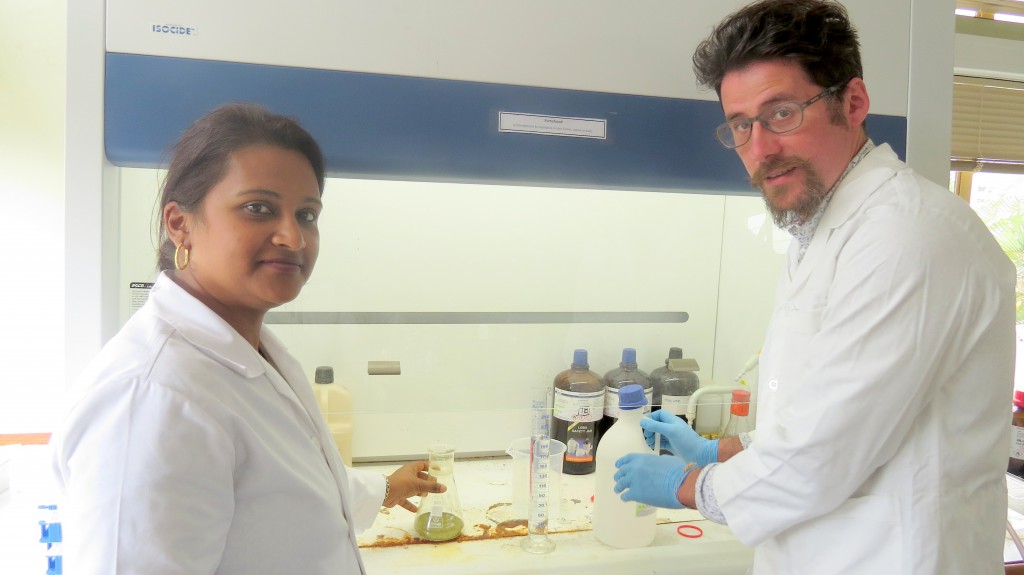
Connecting Epigenetics and Natural Resources
The 2015-16 GYA North-South Interdisciplinary Grant was awarded to Alexander (Sashsa) Kagansky (UK) and Vidushi Neergheen-Bhujun (Mauritius) for their research proposal: Connecting Epigenetics and Natural Resources: The Road Towards Cancer Management and Biodiversity Conservation.
About the GYA North-South Interdisciplinary Grant
The GYA includes a diverse membership of scientists and scholars, in many disciplines, based in low- and middle-income and high-income countries. This grant scheme was initiated in 2014, aiming to foster collaboration across the lines that often separate researchers and limit possibilities. Specifically, this scheme facilitates the development of small-scale, innovative, curiosity-driven, blue-sky, exploratory research pilots or prototypes that unite researchers in low- and middle-income and high-income countries and cross disciplinary boundaries.
The North-South Interdisciplinary Grant is awarded annually, and is meant to provide seed money to enable GYA members to prepare a proof of concept, prototype, or pilot research project with a view to securing larger external funding.
N/A
Research Aims
In 400 B.C. Hippocrates said, “Let thy food be thy medicine and thy medicine be thy food.” Despite technological and cultural advances, the essence of these words has seen contemporary resurgence through renewed interest in food and their ability to reduce the incidence of chronic diseases. The deliverable summarizing objective of this trans-disciplinary project will thus be to demonstrate how food plants, edible mushrooms and marine invertebrates, traditionally known for their medicinal uses in Mauritius can intercept metabolic networks and epigenetic reactions that promote tumorigenesis. This will thus provide the basis for the conservation of the remaining tropical biodiversity in Mauritius in order to keep researching anti-cancer properties on natural compounds within the increasingly aging and technologically advancing world. In addition, the findings will help to better understand the mechanisms of action in order to predict their respective efficacy thereby validating their medicinal properties.
A paper on medicinal plant extracts by GYA member Alexander Kagansky (Russia) and alumna Vidushi Neergheen-Bhujun (Mauritius) was published in ActaNaturae (Vol. 11/1), 2019. Vidushi and Sasha teamed up with colleagues from the Far Eastern Federal University Vladivostok, the University of Mauritius, Keele University, and the University of Edinburgh.
Their paper on “Mauritian Endemic Medicinal Plant Extracts Induce G2/M Phase Cell Cycle Arrest and Growth Inhibition of Oesophageal Squamous Cell Carcinoma in Vitro” shows that Mauritian medical herbs possess anti-tumor properties. The plant extracts contain natural chemical compounds to inhibit the propagation of cancer cells. Terrestrial plants have contributed massively to the development of modern oncologic drugs, and this study now provides scientific evidence of their chemotherapeutic potential. While much more research is needed before these compounds can be turned into medicine, the study also shows that preserving the planet’s biodiversity is highly relevant for the future of global medicine development.
The group’s research was also reflected in a piece in Newsweek on “Medicinal Herbs from Indian Ocean Island Found to Stop Growth of Cancer Cells”.
This paper is a direct outcome of their collaboration on this Interdisciplinary Grant project. Their work also led to the establishment of the GYA Biodiversity working group in 2017.
Vidushi and Sasha also profited from mission funds from the Young Scientist Ambassador Programme in 2015 and 2016, which allowed them to carry out an extra-curricular education activity in Mauritius in November 2015, and an activity with students from a local school in Edinburgh, UK, in March 2016.
© 2024 Global Young Academy